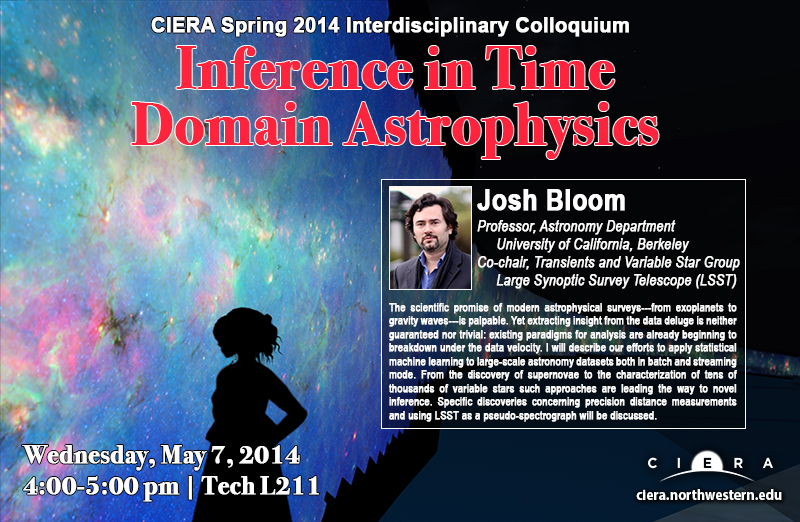Research Events | CIERA Quarterly Interdisciplinary Colloquia | 2013-2014
| CIERA Spring Interdisciplinary Colloquium 2014 |
| May 7 4:00 pm Tech L211 |
Josh Bloom Professor, Astronomy Department, University of California, Berkeley Co-chair, Transients and Variable Star Group, Large Synoptic Survey Telescope (LSST) Inference in Time Domain Astrophysics The scientific promise of modern astrophysical surveys---from exoplanets to gravity waves---is palpable. Yet extracting insight from the data deluge is neither guaranteed nor trivial: existing paradigms for analysis are already beginning to breakdown under the data velocity. I will describe our efforts to apply statistical machine learning to large-scale astronomy datasets both in batch and streaming mode. From the discovery of supernovae to the characterization of tens of thousands of variable stars such approaches are leading the way to novel inference. Specific discoveries concerning precision distance measurements and using LSST as a pseudo-spectrograph will be discussed.
|
| CIERA Winter Interdisciplinary Colloquium 2014 |
| Feb. 17 4:00 pm Tech F160 |
Tony Tyson Distinguished Professor, Department of Physics, University of California, Davis Chief Scientist, Large Synoptic Survey Telescope (LSST)
|
| CIERA Fall Interdisciplinary Colloquium 2013 |
| Nov. 12th 4:00 pm Tech F160 |
Mario Juric LSST Data Management Project Scientist Large Synoptic Survey Telescope Corporation
Entering the Era of Petascale Optical Astronomy |

The Large Synoptic Survey Telescope (LSST) is a
planned, large-aperture, wide-field, ground-based telescope that will
survey half the sky every few nights in six optical bands from 320 to
1050 nm. It will explore a wide range of astrophysical questions,
ranging from discovering “killer” asteroids, to examining the nature of
dark energy. The LSST will produce on average 15 terabytes of data per night, yielding an (uncompressed) data set of over 100 petabytes at the end of its 10-year mission. Dedicated HPC facilities will process the image data in near real time, with full-dataset reprocessings on annual scale. A sophisticated data management system will enable database queries from individual users, as well as computationally intensive scientific investigations that utilize the entire data set. In this talk, I will review what LSST will deliver once operational, discuss implications of LSST-sized data sets on astronomy in the 2020s, and argue that we as a community need to prepare in advance to make the best use of the upcoming petascale datasets. |
Past CIERA Interdisciplinary Colloquia

